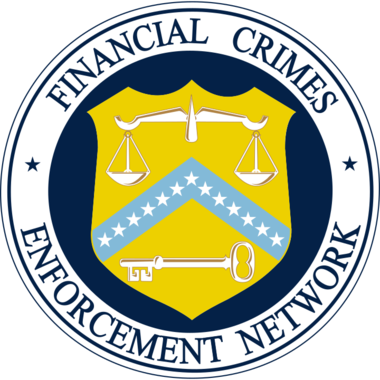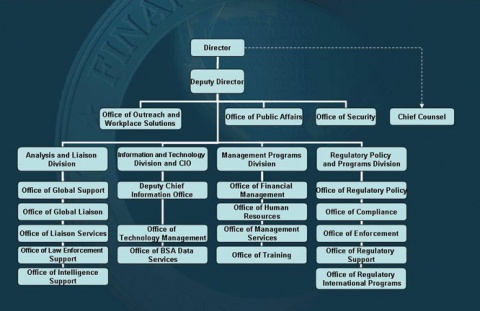Difference between revisions of "Financial Crimes Enforcement Network"
(Created page with "{{group |WP= |logo=US-FinancialCrimesEnforcementNetwork-Seal.svg |logo_width=380px |interests=money laundering, terrorist financing, financial crimes |constitutes= }} ==Offici...") |
(Added: headquarters, website.) |
||
| (3 intermediate revisions by one other user not shown) | |||
| Line 1: | Line 1: | ||
{{group | {{group | ||
| − | |||
|logo=US-FinancialCrimesEnforcementNetwork-Seal.svg | |logo=US-FinancialCrimesEnforcementNetwork-Seal.svg | ||
|logo_width=380px | |logo_width=380px | ||
|interests=money laundering, terrorist financing, financial crimes | |interests=money laundering, terrorist financing, financial crimes | ||
|constitutes= | |constitutes= | ||
| + | |wikipedia=https://en.wikipedia.org/wiki/Financial_Crimes_Enforcement_Network | ||
| + | |headquarters=Vienna, Virginia | ||
| + | |website=http://www.fincen.gov | ||
}} | }} | ||
==Official Narrative== | ==Official Narrative== | ||
The Financial Crimes Enforcement Network (FinCEN) is a bureau of the [[United States Department of the Treasury]] that collects and analyzes information about financial transactions in order to combat domestic and international [[money laundering]], [[terrorist financing]] and other financial crimes. | The Financial Crimes Enforcement Network (FinCEN) is a bureau of the [[United States Department of the Treasury]] that collects and analyzes information about financial transactions in order to combat domestic and international [[money laundering]], [[terrorist financing]] and other financial crimes. | ||
| + | ==History== | ||
| + | In 2001, the [[USA PATRIOT Act]] required the [[US Secretary of the Treasury]], [[Paul O'Neill]], to create a secure network for the transmission of information to enforce the relevant regulations. FinCEN’s regulations under Section 314(a) enable federal law enforcement agencies, through FinCEN, to reach out to more than 45,000 points of contact at more than 27,000 financial institutions to locate accounts and transactions of persons that may be involved in terrorist financing and/or money laundering. A web interface allows the person(s) designated in §314(a)(3)(A) to register and transmit information to FinCEN.{{cn}} | ||
| + | ==Structure== | ||
| + | [[image:FinCEN_organization.jpg|480px|thumbnail]] | ||
{{SMWDocs}} | {{SMWDocs}} | ||
==References== | ==References== | ||
{{reflist}} | {{reflist}} | ||
{{Stub}} | {{Stub}} | ||
Latest revision as of 02:51, 26 August 2016
 | |
| Parent organization | US/Department/The Treasury |
| Headquarters | Vienna, Virginia |
| Interests | money laundering, terrorist financing, financial crimes |
Official Narrative
The Financial Crimes Enforcement Network (FinCEN) is a bureau of the United States Department of the Treasury that collects and analyzes information about financial transactions in order to combat domestic and international money laundering, terrorist financing and other financial crimes.
History
In 2001, the USA PATRIOT Act required the US Secretary of the Treasury, Paul O'Neill, to create a secure network for the transmission of information to enforce the relevant regulations. FinCEN’s regulations under Section 314(a) enable federal law enforcement agencies, through FinCEN, to reach out to more than 45,000 points of contact at more than 27,000 financial institutions to locate accounts and transactions of persons that may be involved in terrorist financing and/or money laundering. A web interface allows the person(s) designated in §314(a)(3)(A) to register and transmit information to FinCEN.[citation needed]
Structure
